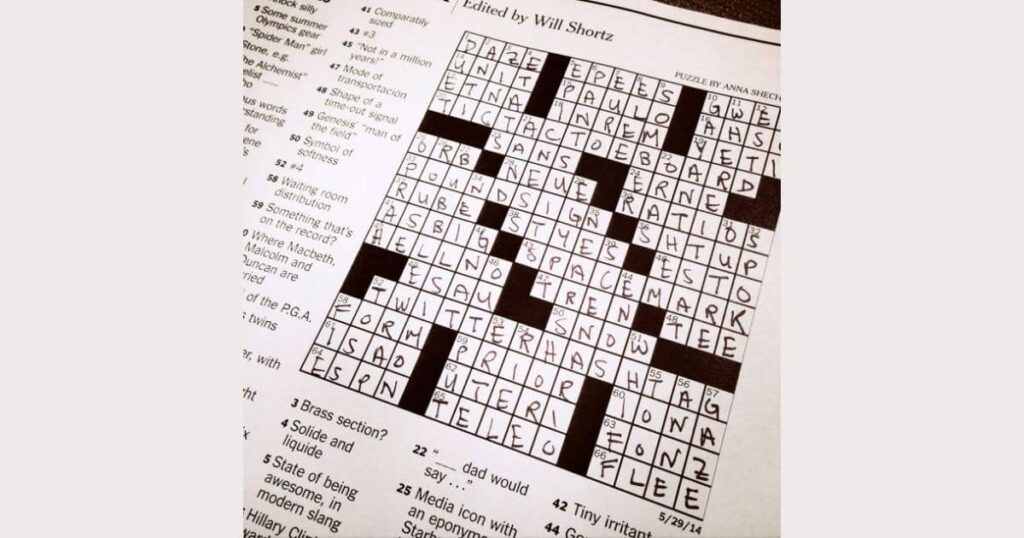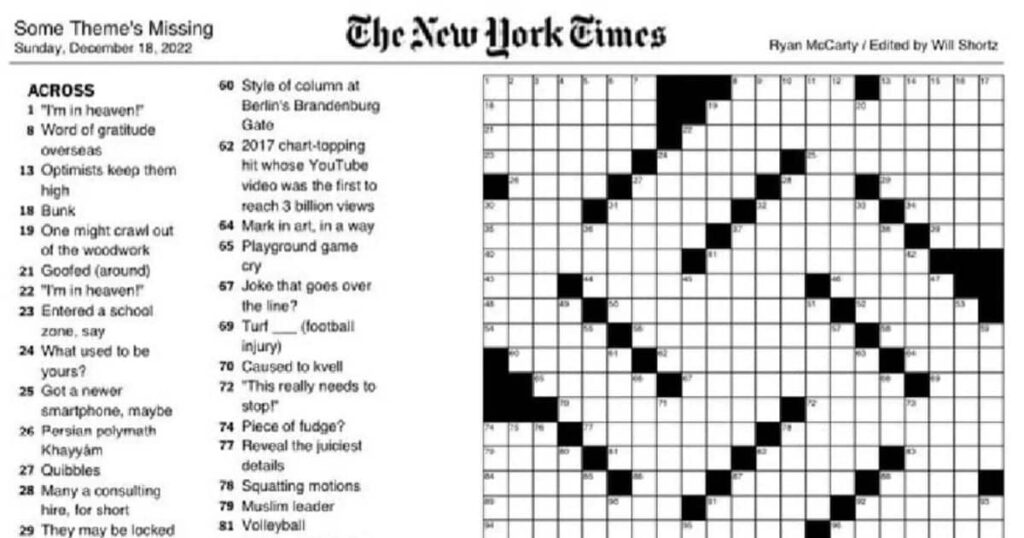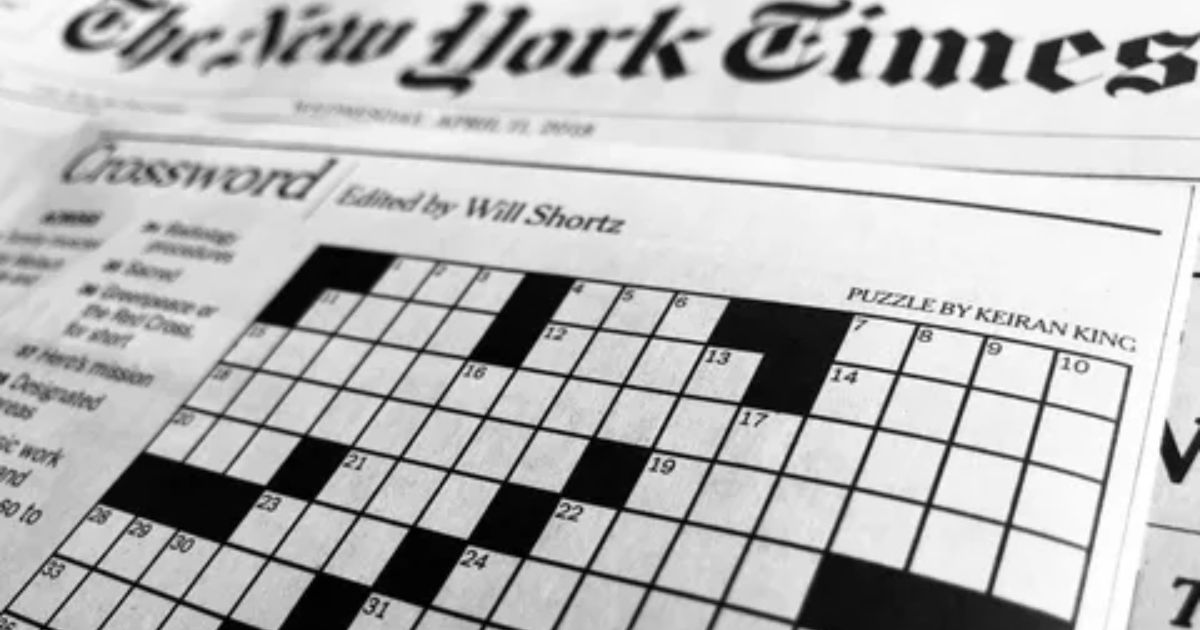Ah, the New York Times crossword puzzle – a daily mental workout that’s as challenging as it is rewarding. For many of us, it’s more than just a pastime; it’s a ritual, a test of wits, and sometimes, a humbling experience. Among the myriad of clues that have puzzled even the most seasoned solvers, the “Short Denial” clue stands out for its deceptive simplicity. Let’s dive into this fascinating little piece of crossword lore and unravel its secrets together.
Understanding the Clue
When you come across a “Short Denial” clue in your NYT crossword, you’re essentially being asked to think of a concise way to say “no.” Sounds simple, right? Well, not so fast! The beauty (and sometimes the frustration) of crossword puzzles lies in their ability to make us think outside the box. A short denial could be anything from a straightforward “no” to more playful variations or even foreign language equivalents.
Common Answers
Let’s explore some of the most frequent answers you might encounter:
- NO: The classic two-letter standby. It’s brief, it’s clear, and it fits in those tiny boxes perfectly.
- NAY: A bit more formal, often used in voting contexts. It’s got that old-world charm, doesn’t it?
- NAH: The laid-back cousin of “no.” It’s casual, it’s cool, and it’s perfect for a more relaxed puzzle.
- NEIN: Sprechen Sie Deutsch? This German denial adds an international flair to your puzzle.
- UH-UH: Can you hear it? This one’s all about capturing the sound of refusal.
Tips for Solving
Now that we’ve covered the common answers, let’s talk strategy. Here are some tips to help you crack those “Short Denial” clues:
- Count the boxes: The number of letters you need is your first big clue.
- Check the cross clues: Sometimes, the intersecting words can give you that “aha!” moment.
- Consider the context: Is the puzzle themed? The answer might tie into the overall concept.
- Think synonyms: Crossword constructors love to play with different ways of expressing the same idea.
Common Words Used in Short Denial NYT Clues
Crossword puzzles are a delightful dance of language, and “Short Denial” clues showcase this beautifully. From the succinct “NO” to the more elaborate “NOPES,” each answer brings its own flavor to the puzzle. Some other variations you might encounter include “NADA” (bringing in a touch of Spanish), “NEVER” (for when a simple “no” just won’t cut it), and even “NOWAY” (for those moments of emphatic refusal).
Examples of Short Denial Clues in Crosswords
Let’s look at some examples of how these clues might appear in your puzzle:
- “Brief refusal” (2 letters): NO
- “Vote against” (3 letters): NAY
- “Informal denial” (3 letters): NAH
- “German denial” (4 letters): NEIN
- “Sound of refusal” (5 letters): UH-UH
- “Casual refusal” (4 letters): NOPE
- “Playful denial” (5 letters): NOPES
- “Russian denial” (4 letters): NYET
Each of these clues asks for a denial, but the subtle differences in wording guide you towards the specific answer the constructor is looking for.
Read Also About: WordFinderX: Discover 5 or More Ways to Ignite Your Word Mastery
Benefits of Practicing with Short Denial NYT Clues
You might be wondering, “Why focus so much on these little ‘no’ clues?” Well, there’s more to it than meets the eye. Practicing with “Short Denial” clues can significantly improve your overall crossword-solving skills. Let’s break it down:
Enhances Vocabulary
Working with these clues exposes you to a variety of ways to express denial across different contexts and languages. It’s like a mini-language lesson wrapped up in your daily puzzle!
Improves Problem-Solving Skills
These clues challenge you to think analytically and recognize patterns. You’re not just filling in boxes; you’re decoding the constructor’s thought process.
Boosts Crossword Solving Speed
As you become more familiar with common “Short Denial” answers, you’ll find yourself solving these clues faster, giving you more time for those tricky long answers.
Strengthens Language Skills
From spelling to understanding nuances in meaning, these clues are a workout for your language muscles.
Encourages Strategic Thinking
You’ll learn to use context clues and cross-references more effectively, skills that apply to solving the entire puzzle.
Provides Enjoyment and Satisfaction
There’s a special thrill in quickly solving a clue, even a short one. It’s these little victories that keep us coming back to the crossword day after day.
The Art of Crossword Construction

Have you ever wondered how crossword constructors come up with these clues? It’s a delicate balance of creativity and constraint. For “Short Denial” clues, constructors need to consider not just the answer itself, but how it fits into the larger puzzle. They might choose “NAY” over “NO” not because it’s a better denial, but because it connects better with the surrounding words. It’s like a linguistic jigsaw puzzle!
The Evolution of Short Denials in Crosswords
Crossword puzzles have been around for over a century, and “Short Denial” clues have evolved along with them. In the early days, you might have seen more formal denials like “NAY” or “NARY.” As puzzles became more playful and colloquial, answers like “UH-UH” and “NOPES” started to appear. This evolution reflects changes in our everyday language and keeps the puzzles fresh and engaging.
Cultural Variations in Short Denials
One fascinating aspect of “Short Denial” clues is how they can introduce solvers to denials from different cultures. Beyond “NEIN” and “NYET,” you might encounter “NON” (French), “NE” (Italian), or even “IIE” (Japanese). These international denials add a global flavor to the puzzle and remind us of the rich tapestry of human language.
The Psychology of Denial in Crosswords
Interestingly, our approach to “Short Denial” clues can say something about our problem-solving style. Do you immediately think of “NO,” or do you consider less common options first? Are you thrown off by foreign language denials, or do you relish the challenge? Your responses to these clues might reflect your broader approach to challenges and new information.
Short Denials in the Digital Age
With the rise of online and app-based crosswords, “Short Denial” clues have taken on new life. Digital puzzles can track how quickly solvers answer these clues, providing valuable data on solver behavior. Some apps even use this data to adjust difficulty levels, ensuring that each solver gets a appropriately challenging experience.
Read This Also: B21.Ag- The Most Dynamic Platform ForCrypto Investments
The Role of Short Denials in Crossword Themes
Sometimes, “Short Denial” clues play a pivotal role in themed puzzles. Imagine a puzzle where all the theme answers are phrases that start with different ways of saying no:
- NOWAY JOSE (A emphatic refusal)
- NEINTEEN EIGHTY-FOUR (A play on Orwell’s novel with a German twist)
- NOTSOBAD (An understatement meaning “pretty good”)
In these cases, understanding various short denials becomes crucial to cracking the puzzle’s central concept.
Short Denials Across Different Puzzle Difficulties
As you progress from Monday to Saturday NYT puzzles (with Sunday being a larger, midweek-difficulty puzzle), you might notice a shift in how “Short Denial” clues are presented:
- Monday/Tuesday: Straightforward clues like “Brief refusal”
- Wednesday/Thursday: More playful clues like “What a head-shaker might say”
- Friday/Saturday: Trickier clues like “Opposite of a rubber stamp?”
This progression challenges solvers to think more creatively and draw on a broader vocabulary as the week goes on.
The Crossword Constructor’s Perspective
From a constructor’s viewpoint, “Short Denial” clues are incredibly useful. They’re versatile fill words that can help connect different sections of a puzzle. But there’s an art to using them effectively:
- Variety is key: Using the same short denial multiple times in one puzzle is generally frowned upon.
- Clue creativity: Constructors strive to create fresh, engaging clues even for these common words.
- Balancing act: While useful, a puzzle shouldn’t rely too heavily on short denials at the expense of more interesting vocabulary.
Short Denials in Crosswordese
“Crosswordese” refers to words that appear frequently in crosswords but rarely in everyday language. Some short denials, like “NAY,” could be considered crosswordese. While these words are useful for constructors, some solvers find them frustrating. However, knowing these crosswordese denials can significantly boost your solving speed.
Regional Variations in Short Denials
Even within English-speaking countries, short denials can vary:
- “NAH” might be more common in American puzzles
- “NUP” could appear in Australian crosswords
- “NAE” might show up in puzzles with a Scottish theme
These variations add a delightful cultural flavor to puzzles and can teach solvers about linguistic differences.
The Future of Short Denial Clues
As language evolves, so too will “Short Denial” clues. We might start seeing clues referencing digital communication, like:
- “Texted turndown” for “NOPE”
- “Swipe left, essentially” for “NAH”
Crossword puzzles have always reflected contemporary language, and “Short Denial” clues are no exception.
Mastering Short Denials: A Solver’s Journey
For many solvers, there’s a clear progression in tackling “Short Denial” clues:
- Beginner: Familiar with “NO” and maybe “NAY”
- Intermediate: Comfortable with casual forms like “NAH” and “NOPE”
- Advanced: Recognizes foreign language denials and obscure variations
- Expert: Can quickly discern which denial fits based on subtle clue wording
This journey mirrors the overall progression of crossword solving skills, making “Short Denial” clues a microcosm of the entire crossword experience.
Short Denials in Crossword Tournaments

In competitive crossword solving, quickly recognizing and filling in “Short Denial” clues can shave precious seconds off solving times. Top solvers often have these answers at their fingertips, allowing them to focus mental energy on more challenging aspects of the puzzle.
The Zen of Short Denials
There’s a certain irony in how much time and energy we devote to different ways of saying “no” in crosswords. Perhaps it’s a reminder that in puzzles, as in life, negation is just as important as affirmation. Every “no” in a crossword is also a “yes” to the correct answer, a small victory in the larger conquest of the grid.
Embracing the Challenge
So, the next time you’re faced with a “Short Denial” clue, embrace it. Whether it’s a simple “NO” or an esoteric foreign refusal, each of these clues is an opportunity to engage with language, culture, and the unique art form that is the crossword puzzle.
Remember, every great solver started with learning these basic building blocks. Your journey from hesitantly penciling in “NO” to confidently ink “NARY A ONE” is a testament to your growing skills and knowledge.
FAQ’s
Is it okay to look up crossword answers?
It’s a personal choice. Many solvers prefer not to. It can help beginners learn. Ultimately, do what makes the puzzle enjoyable for you.
Which day of the week is the hardest NYT crossword?
Saturday. Difficulty increases from Monday to Saturday. Sunday puzzles are larger but about Thursday-level difficulty.
How to solve a crossword puzzle easily?
Start with clues you’re sure of. Use crossing letters. Look for fill-in-the-blank clues. Consider wordplay. Practice regularly to improve.
What is 101 in the NYT crossword?
“101” often indicates a beginner’s course. In crosswords, it might be clued as “Intro course” or “Beginner’s class.”
Conclusion: The Joy of Saying “No” in Crosswords
In the end, “Short Denial” clues are more than just filler in your daily crossword. They’re a window into language, a test of knowledge, and a source of small but significant triumphs. Whether you’re a novice solver still getting the hang of “NO” and “NAY,” or a seasoned pro who can rattle off denials in a dozen languages, these clues have something to offer.
So the next time you encounter a “Short Denial” clue in your NYT crossword, take a moment to appreciate the craft behind it. Consider the many ways we express refusal in our rich and varied language. And remember, in the world of crosswords, sometimes saying “no” is the most satisfying answer of all.
Happy solving, fellow crossword enthusiasts! May your pencils be sharp, your erasers rarely needed, and your “Short Denial” clues always a source of quick and confident answers. Now, if you’ll excuse me, I have a puzzle to finish – and I won’t take “no” for an answer!

With a robust five-year background in the ever-evolving realm of tech gadgets, I bring a wealth of hands-on experience and a deep understanding of the latest technological advancements.











